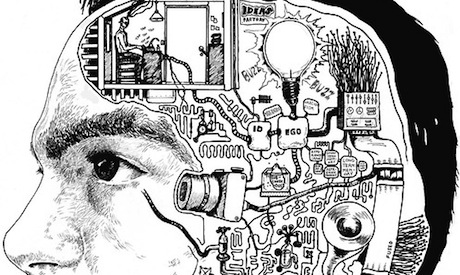Chinwag Psych Interview: Benjamin Ellis, "Human Big Data - Using Behavioural Aggregates in Business"
The Chinwag Psych event is coming up fast - do you have your ticket?
If you do, you’ll witness a compelling investigation inside the human mind, and how the results can be applied to business.
One of the speakers to catch is Benjamin Ellis. As the principle CEO of two businesses, Redcatco and SocialOptic, he has his eye on how people can work together better and which software can provide the insights on how that happens.
 SocialOptic looks at how technology can create small interventions to help people work together more effectively. One of the products you may have seen is Milestone Planner, a project management tool that works across devices and makes processes more social.
SocialOptic looks at how technology can create small interventions to help people work together more effectively. One of the products you may have seen is Milestone Planner, a project management tool that works across devices and makes processes more social.
The product collects what Benjamin calls ‘human big data’ and will be the core of his presentation at Chinwag Psych.
Aggregate Rather than Individual
So how can you collect data to help employees, teams and companies without making everyone feel as though they are working in a panopticon?
“This is the exciting thing for me about social software,” Benjamin told Chinwag. “The public versions you might recognise are things like Twitter and Facebook. But there are equivalents that businesses can use.
“They make behaviours more visible and that can sound a bit like snooping but what we are really doing is looking at behaviour aggregates. That could be really simple stuff like, how actively are people commenting on announcements that are coming up inside the organisation? How much are they sharing them? Are there parts of the organisation that are more active than others or parts that become more active?"
Benjamin claims aggregated information creates a picture of what people are interacting with or sharing. Similar to the way that brands might track statistics across public social media, the feedback from these processes can be applied internally for companies to see what is engaging employees and what might not be working well at all.
“Really what we are doing is looking at stuff in abstract - that's the more valuable thing,” he continues. “There is a whole set of biases that people tend to fall into around human big data and social software. When it comes to big data, we're actually not very good at making sense of it. This is because we look at the details. If I look at something that someone writes, then I have an emotional reaction to it and that starts to colour how I see things.”
Oddities in Choice
It seems that we really do have some curious biases when it comes to decision making.
One example he points out is the Decoy Effect, or asymmetric dominance. This is what happens when a person has two options and a third is introduced.
“If you ask someone if they would like a free weekend in Rome or Paris, they might have to think about that decision, unless they have a particular bias for one or the other based on past experience,” explains Benjamin.
“If I then say there are three options, they can go to Rome or Paris, but there are two choices in Paris - one with free coffee and other where each cup of coffee costs £2.50, people tend to choose Paris over Rome.”
Because we see an easy choice, we get distracted by that decoy. This leads to faster decision making and a steered decision.
“There's no such thing as a neutral presentation of data,” says Benjamin. “Any time we show data, we bring biases to it and we elicit biases in the people who see that data. This is a major challenge ahead with the fact that now we can get all this data from social software.
“This is great, and we've got all this web data we can get in the ecommerce world, in all sorts of spaces. The issue is that just looking at that data from a decision making perspective, we've got a lot of biases that cause us to look at it in odd ways if we are not careful about how we present it.”
Changing the Way we Work
Big businesses are adopting psychology to be more efficient.
Benjamin points out that there has been a shift from traditional workplaces that were driven by a manufacturing mentality to a knowledge-based environment.
“Modern businesses are driven by knowledge and because of this, human factors and relationships dominate. That means there is a big shift in the workplace where the relevant understanding for making things better shifts from traditional management science and process to the human stuff and that's where psychology comes in and can help.”
“We've gone from environments where information is scarce to environments where information is abundant. We are very maladapted and don’t deal well with an abundance of information. Psychology can inform us in terms of how we can stop some of the worst excesses of that in terms of data overload and how we understand data to make better decisions.
You can find out more about what Benjamin does with with big human data at the event. Though social software is not always the answer, deciding where or how to use it can bring to light more important questions around running an efficient business.
// Grab your ticket for Chinwag Psych May 9 here.
Photo (cc) ky_olsen.





